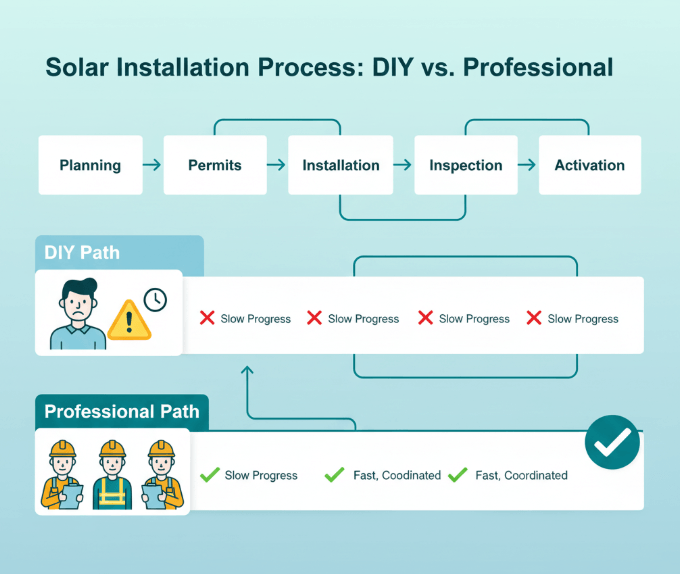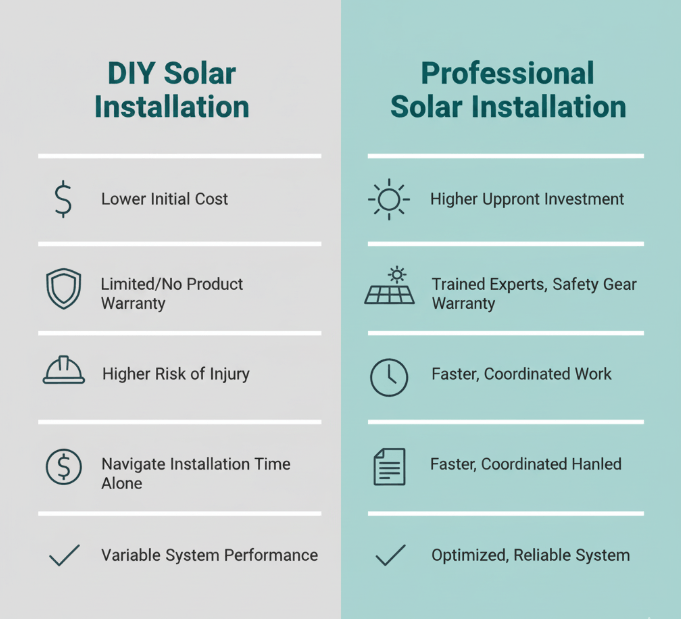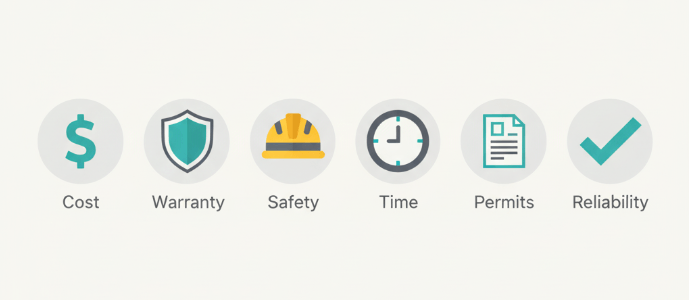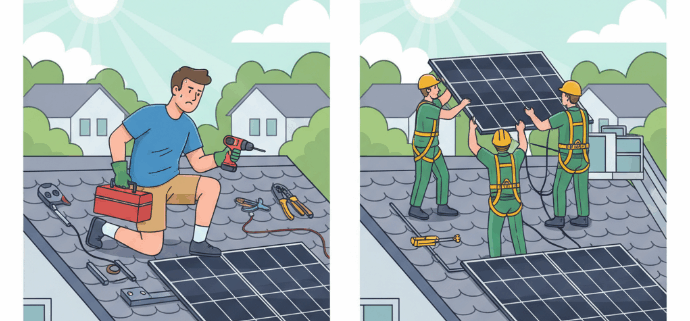DIY Solar Panel Installation vs. Hiring a Professional: Which Is Best for You?
Solar energy is no longer a futuristic concept — it’s a mainstream, cost-effective solution for homeowners worldwide. Falling panel prices, tax incentives, and financing programs make it easier than ever to install solar. But one big question remains: Should you install solar panels yourself (DIY solar panel installation), or hire a professional installer?
At first glance, DIY solar panel installation seems appealing — you cut labor costs and get full control over the project. On the other hand, professional solar installation provides safety, warranty protection, and long-term performance optimization.
This article compares both options in terms of cost, safety, compliance, and return on investment — and provides resources from Sunlith Energy and trusted organizations like the Department of Energy to guide your decision.
Why Homeowners Choose DIY Solar Panel Installation
DIY solar has gained traction thanks to online tutorials, hardware kits, and the rise of DIY culture. Let’s explore why some homeowners take this route.
Cost Savings from DIY Solar Panel Installation
The biggest attraction of DIY solar is cost reduction. Professional labor can account for 10–20% of total system costs. For a $20,000 installation, that’s $2,000–$4,000 in savings.
However, it’s important to factor in potential risks. Incorrect installation can cause long-term efficiency losses, which might erase your upfront savings.
💡 Many warranties and incentives, like those tied to UL Certifications for Battery Systems, require professional installation to remain valid.
Customization and Control
DIY installation gives you freedom to pick every component — from panels to inverters to storage systems. This level of customization is attractive for those building off-grid systems or experimenting with BESS vs ESS solutions.
The Learning Experience
If you enjoy hands-on projects, DIY solar is an opportunity to learn about electrical systems, panel orientation, and energy production. The sense of pride in generating power from a system you installed yourself is a big motivator.
Risks and Challenges of DIY Solar Panel Installation
While the benefits of DIY solar are tempting, the risks are real.

Safety Concerns
Solar panels generate high-voltage DC electricity, which can be dangerous if mishandled. Rooftop work also introduces fall hazards. The Occupational Safety and Health Administration (OSHA) highlights the importance of proper training and safety gear when working with solar equipment.
Warranty and Insurance Issues
DIY installations often void equipment warranties. For instance, UL 1642 battery certifications stress safe handling requirements that are usually tied to certified installations.
Insurance can also be an issue — some homeowner policies won’t cover damage caused by unlicensed work.
Navigating Permits and Codes
Every solar installation must comply with building codes, zoning laws, and utility interconnection rules. If you install panels incorrectly or skip inspections, you may face penalties or be forced to redo the system.
The U.S. Department of Energy provides guidelines for permits, inspections, and interconnection to the grid — but managing them without professional support can be overwhelming.
Time and Efficiency Tradeoffs
DIY projects often stretch into weeks or months. Meanwhile, a professional team can complete installation in a few days, including permits and inspections. Delays can slow down your access to solar savings.
Benefits of Hiring a Professional Solar Installer
Professional installation remains the preferred choice for most homeowners. Here’s why.
Expert System Design
Professional installers assess your roof orientation, shading, and energy usage to design a system that maximizes efficiency. According to the National Renewable Energy Laboratory (NREL), design optimization can improve system output by up to 20%.
Safety and Compliance
Licensed contractors ensure compliance with IEC and UL certifications — key for long-term system reliability. For example, IEC certifications for BESS guide safety and performance for energy storage systems. Professionals ensure your system passes inspection and qualifies for rebates.
Warranty and After-Sales Support
Professional installations typically include workmanship warranties (5–10 years). If panels fail, the installer handles replacements. This is especially valuable when working with advanced systems like UL 2580 certified EV batteries that require strict safety compliance.
Faster Installation and Paperwork Handling
Professionals handle permitting, inspections, and utility approvals — reducing your workload. According to Energy.gov, certified installers also ensure your system qualifies for federal solar tax credits, something DIY projects may not guarantee.
DIY Solar Panel Installation vs. Hiring a Professional: Side-by-Side Comparison

| Factor | DIY Installation | Professional Installation |
|---|---|---|
| Cost Savings | Saves ~10–20% on labor | Higher upfront, but reliable ROI |
| Control Over Components | Full customization | Expert recommendations |
| Warranty Eligibility | Often voided | Full coverage maintained |
| Permits & Paperwork | Homeowner manages | Installer handles |
| Safety & Risk | High (rooftop + electrical hazards) | Low with trained crew |
| Installation Time | Weeks to months | Few days |
| Reliability | Dependent on skill | High consistency & support |
| Long-Term Value | May decline if errors occur | Optimized for decades |
DIY Solar Panel Installation vs. Hiring a Professional FAQ
Is DIY solar panel instalation legal?
Yes, but you must comply with local codes and permitting requirements. See DOE’s solar permitting guide for details.
How much can I save with DIY solar?
Typically 10–20% on labor. But errors, lost warranties, and insurance exclusions can erase those savings.
Do DIY systems qualify for rebates and tax credits?
Some programs require professional installation. Always check requirements before starting.
Can a DIY system perform as well as a professional one?
Yes — if designed and installed correctly. However, the risk of inefficiency is higher without professional expertise.
What’s the biggest hidden cost of DIY solar?
Lost warranties and rework if your system fails inspections or underperforms.
H
Conclusion: Which Path Should You Take?

- DIY solar panel installation may be right for skilled homeowners who are comfortable with electrical work, confident with permits, and eager to save on labor costs.
- Professional installation is the safer, more reliable choice for those who prioritize performance, warranty protection, and eligibility for incentives.
As the International Energy Agency (IEA) reports, global adoption of solar energy continues to accelerate. Whether you go DIY or professional, you’re joining a growing movement toward renewable, sustainable power.
For most homeowners, the peace of mind, warranty coverage, and optimized system performance from professional installation far outweigh the initial savings of DIY.
👉 Want to explore more? Check out our guides on UL certifications for battery systems, BESS vs ESS, and IEC compliance to better understand how certified installations add long-term value.





Trackbacks & Pingbacks
[…] is the robust framework that securely fastens your solar panels to your roof. A well-engineered mounting structure is essential to withstand India’s diverse […]
[…] Modern solar panels are more efficient than ever. While production does drop on cloudy days, panels still generate […]
[…] future of clean energy doesn’t stop at installing solar panels or wind turbines—it lies in our ability to store energy affordably, reliably, and sustainably. […]
[…] Q5: Who should install my solar system?Always work with certified, reputable installers. A professional will ensure your system is safe, ef… […]
Leave a Reply
Want to join the discussion?Feel free to contribute!